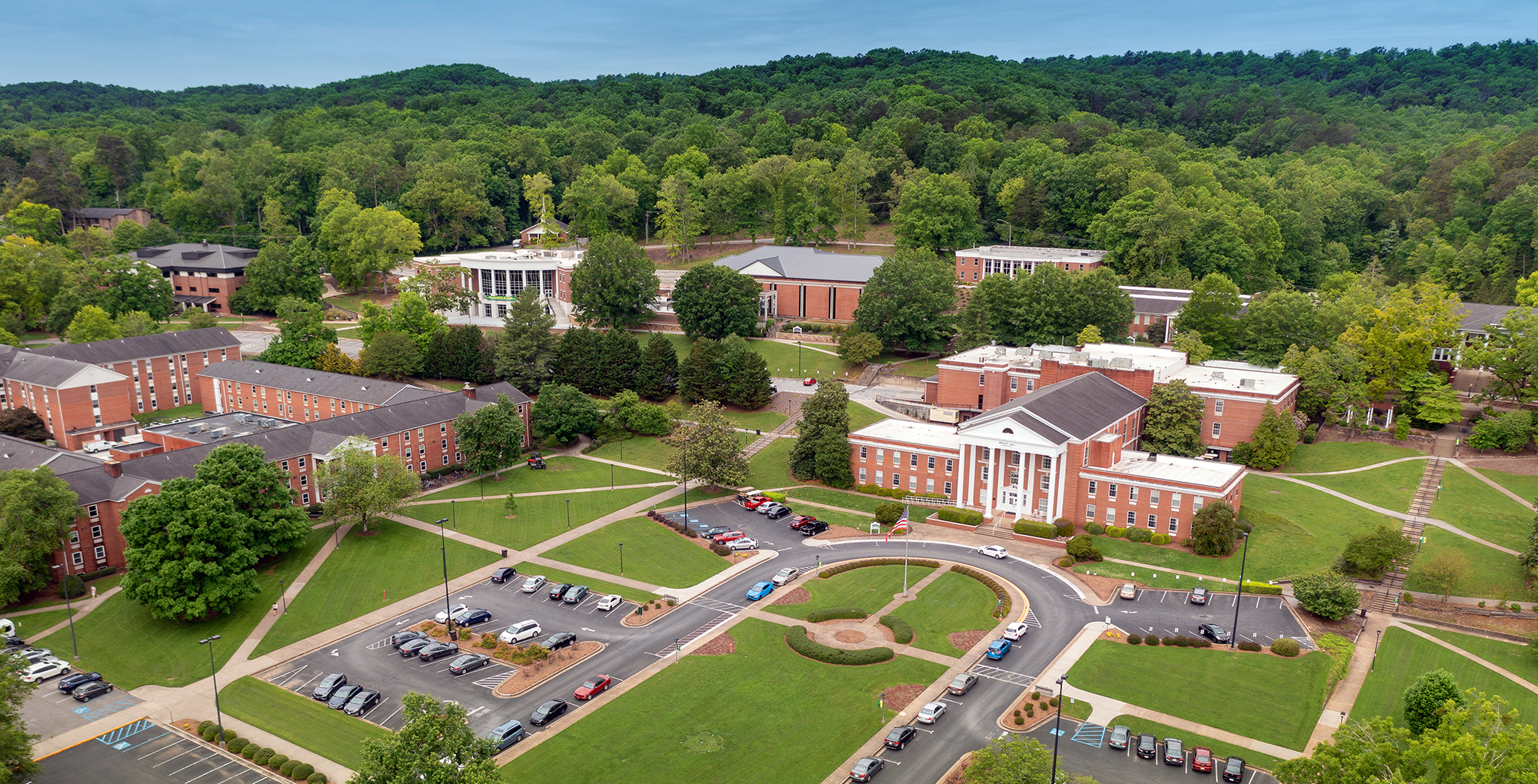
Quicknotes | february 2019
STUDENT WEEK OF PRAYER
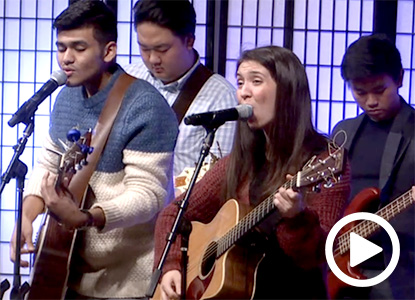
In addition to the abundance of professional ministry resources on Seventh-day Adventist college and university campuses, peer-to-peer learning has its own critical role in spiritual care.
Southern encourages these interactions at every turn, especially through small-group studies in casual environments. The annual Student Week of Prayer supplements that method using a different approach, positioning students front and center in the sanctuary stage spotlight to share deeply personal testimonies with an audience eager for authenticity. During the last week of January, six students accepted this nightly challenge and spoke on the theme “Bare Feet, Holy Ground.”
Assistant Chaplain Andrew de Jesus, ’18, advised student speakers to focus less on an altar call and more on application.
“Each night the student speakers shared what their walk with God looked like and why they continued the walk despite challenges,” de Jesus said. “When our bare feet touch God’s holy ground, a life-changing, life-long journey begins. This journey is not always pretty, but God promises that He will bring us through it.”
Presenters were nominated by fellow students and their majors ranged from theology and religious studies majors to chemistry and culinary arts. Student Week of Prayer presentations are available online.
-Staff Report
BROCK HALL RENOVATIONS
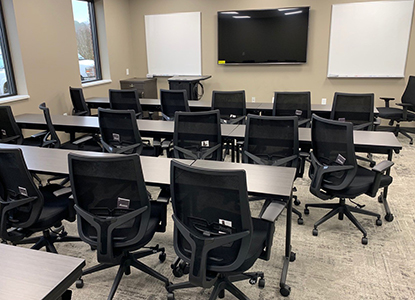
After 12 months of designing and five months of construction, Brock Hall is now home to several new classrooms. These first-floor renovations repurposed space once occupied by Classical 90.5 WSMC before the radio station moved across Colcord Drive to a free-standing building adjacent to Brock Hall.
From a location standpoint, the $325,000 project most directly impacts the School of Journalism and Communication (SJC); the classrooms are behind the SJC office suite, and one of the spaces is a new photography studio. However, the five new classrooms will be used by a wide array of majors since there will also be dedicated classrooms for speech and English courses, which are required by most disciplines.
Professors are thrilled to be in the new space. The English Department team, led by Keely (Kuhlman) Tary, ’97, PhD, is teaching 23 English classes in three of the new rooms, slightly more than half of its total number of classes. Aside from convenience for professors, the additional classrooms have simplified life for students, as well—especially new students.
“It amazes me that just a few renovated classrooms can have such a significant impact,” Tary said. “At the beginning of previous semesters, we often had students wandering around Brock looking for their English classes, and they would be surprised when we looked up their section and told them their class met in Florida Hospital Hall, Daniells Hall, Summerour Hall, or even Hulsey Wellness Center—pretty much anywhere but Brock Hall! Being in Brock makes more sense to students, even though we’re still not teaching on the third floor where English Department offices are located.”
Additional improvements for academic areas housed in Brock Hall include plans to build a broadcast production and film studio shared by SJC and the School for Visual Art and Design.
-Staff Report
PILOT PROGRAM NURTURES STUDENTS
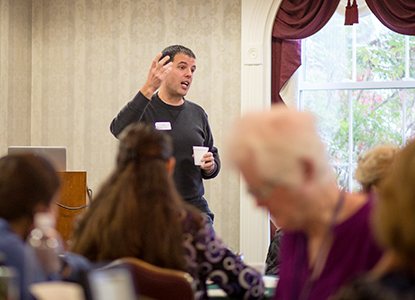
Calling is defined as a transcendent summons, finding meaning in a job, and making a difference in the world. Sadly, many college graduates across the country enter the workforce and adulthood unequipped to maximize their full potential for serving humanity and God. Other students fail to even make it to graduation, discouraged and defeated by a perceived lack of purpose and direction.
Southern recently began researching the role calling plays in these negative outcomes and the university’s capacity to help correct such far-reaching problems.
The Sophomore Success Program launched last fall with 32 self-selecting sophomores. Students took the Clifton Strengths assessment to discover what they naturally do best and now meet monthly with a group of faculty and staff mentors for lunch to discuss how recognizing their own strengths plays a role in matching career with calling. Measurable goals for the program include helping students:
• Recognize how and from where calling originates
• Find meaning in calling, which encourages them to continue career training
• Evaluate how their choice of vocation adds to the greater good of society, and
• Increase sophomore-to-junior retention by five percent.
The Sophomore Success Program is led by biology professor Rick Norskov, ’76, MD, and Cynthia Gettys, PhD, the director of Southern’s Center for Teaching Excellence.
“Teaching this process of discernment is critical because I see both students and older folks who don’t have the structure in place to know if they’re on the right track with their calling journey,” Norskov said. “Of all the things Adventist colleges and universities should be concerned with, to help students discover God’s call on their lives is at the top!”
Daniel Tanksley, sophomore biology major, is already benefitting from the program.
“I’m learning how to approach professors and shadow other professionals, asking them very specific questions related to vocation,” Tanksley said. “They are part of the few that go to work and love what they do. I want that too!”
The Sophomore Success Program is gathering attention off campus as well. Gettys and Norskov have been asked to present details of Southern’s pilot program in March 2019 at the national conference by NetVUE (Network for Vocation in Undergraduate Education). Program leaders have applied for outside grants that, if awarded, could grow the Sophomore Success Program to include 128 sophomores and 42 mentors next school year.
-Staff Report
GALLERY EXTENDS DATES FOR EXHIBIT
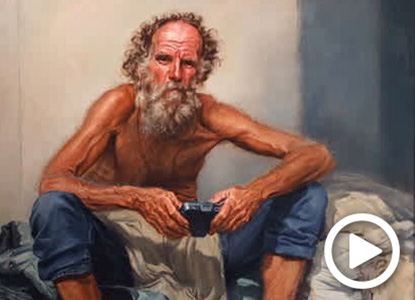
In November, Southern opened a gallery exhibit titled “The Human Spirit” by internationally known portrait artist Harry Ahn. The pieces have been well received and Southern’s School for Visual Art and Design recently extended the exhibit through February 15.
Ahn was born in North Korea and fled to South Korea as a child. He began studying art in Seoul and later continued his studies in Canada. Ahn has won many awards, including ones from the Portrait Society of America and from Oil Painters of America. He has been teaching at Andrews University since 1990; it was there that Southern’s museum curator, Giselle Hasel, MFA, met him when she was a student.
“Ahn was one of the best classical professors,” Hasel said. “He is our Seventh-day Adventist Rembrandt!”
Ahn’s current exhibit at Southern, “The Human Spirit,” is a selection of paintings focused on the homeless. In this compilation of pieces, he reflects on his memories as a refugee child during the Korean War and expresses his compassion for those enduring similar circumstances. Ahn’s realistic portraits highlight human dignity and call people to recognize the value of human life, regardless of a person’s social standing.
“All art, especially painting, needs spirit,” Ahn said. “Without that, it becomes just another piece of work, technically sound but with no heart.”
“The Human Spirit” is free and open to the public. For exhibit hours details, contact the School of Visual Art and Design at 423.236.2732.
-Staff Report
BUSINESS MAJOR RECOGNIZED
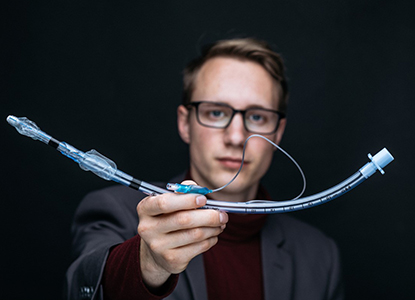
This past fall, a Southern student beat out professional competition to be recognized by Chattanooga’s technology community for his invention. Caleb Sutherland, junior business management major, earned a place as one of three finalists for the Chattanooga Technology Council’s annual Early Innovator Award.
Sutherland’s invention, a lung isolation tube (LIT), is a Class II medical device designed to treat pneumothorax and tension-pneumothorax (a punctured lung, usually caused by a traumatic injury). Sutherland had become a certified emergency medical technician in Alaska at 18, which opened his eyes to the need for such a device. After his discussion this past spring with a paramedic from Washington who had also noticed the need, the two collaborated to develop the initial idea for a solution.
Before Sutherland’s invention, the standard method of treatment for pneumothorax provided very temporary relief. Inspired by methods employed in the military, he created a tube, specifically for this condition, that can be inserted and inflated so the patient is completely stabilized. With the help of two medical advisers, Sutherland patented his device. Soon afterward, his lawyer nominated him for the Chattanooga Early Innovator Award.
As a finalist, Sutherland was invited to attend the Spirit of Innovation Award luncheon, where he was able to network and connect with other local businesses. Although he did not win the award, Sutherland is excited to take the next steps toward marketing his invention. He is in talks with several different investors and manufacturers as well as innovation officers from Blue Cross Blue Shield Tennessee.
“I love innovation,” Sutherland said, “things that are new; things that, in this case, very literally save lives; things that can benefit the world around us. I cannot wait to continue on this incredible journey!”
-by Trisney Bocala, sophomore communications major
HISTORY PROFESSOR GIVES BACK TO SOUTHERN
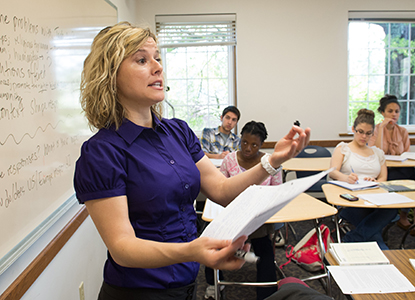
Lisa (Clark) Diller, ’96, PhD, chair of the History and Political Studies Department, graduated as a Southern Scholar and received both her master’s degree and doctorate from the University of Chicago. She returned to campus in 2002 as a faculty member with a mission to keep history alive by reminding students that they still have choices as we “make history” together. Diller’s education, wisdom, and passion for Southern make her an agent of change on campus, influencing students through gifts of talent and treasure.
What brought you back to Southern and anchors you here? I was recruited by an outstanding department and given the opportunity to work with historians who I respected as scholars and teachers. I continue to get to work in a department that provides freedom to teach in areas of my strengths and to mentor students to be outstanding Christian scholars.
Why did you decide to become a donor? I am an alum of Southern and received a substantial scholarship in order to attend that allowed me to go on to graduate school without the burden of debt. I am grateful and wanted to give back to my undergraduate institution, one that treated me very well. I’m also inspired by our alumni who give just a little bit of money regularly, especially the ones who might not be able to afford much.
Are there certain areas on campus where you direct your financial gifts? I have chosen to give without strings attached on a monthly basis so that Southern can use it for the things that are needed most, the specifics of which I may not be aware. However, our department consistently fundraises for student professionalizing experiences: research trips as well as presenting at and attending conferences. I like to give a bit extra to those funds as well!
Do your students know that you are literally investing in their future? I talk with my students every year about giving to Southern—especially the seniors. I don’t necessarily share about my own giving but do mention that faculty in our own department contribute funds that are directly helping history students. I remind them they can also give back and that they have “ownership” of this institution because it has shaped them and they have shaped it. I really want them to stay connected and to see that giving is one of the ways they can accomplish this.
What’s your elevator pitch to alumni or community members about making a gift to Southern alongside you? I have a variety of approaches that depend on the context of my audience. Probably one of the most consistent elements of these quick conversations has to do with helping our students learn who they are and how they can develop optimal social talents, employment skills, and critical thinking abilities. Our diverse student body and deeply invested employees (from faculty to office managers, residence hall staff to work supervisors) all provide students with a range of experiences that help them learn who they are and who God created them to be.
Along with your financial gifts, how else do you model generous living for students? I enjoy volunteering, both for church and community, and encourage my students to do the same. I am chair of the history committee for the Mayor’s Council on Women in Chattanooga, president-elect of the Southern Conference in British Studies, and vice president for the national Conference on Faith and History. I’m also on the executive team for the Adventist Peace Fellowship, the board for the Encyclopedia of Seventh-day Adventists, and an elder at The Well, my home church in Chattanooga.
-Staff Report
REGISTRATION FOR ITALY GROUP TOUR OPEN THROUGH MARCH 1
Join alumni and friends of Southern May 26 through June 7 for a unique tour of Italy. Explore lakes, mountains, and cities with experienced tour leader Bill Wohlers, PhD. Highlights will span Lake Garda, the Dolomites, Da Vinci’s “Last Supper,” Milan, Venice, Rome, Florence, and the Tuscan countryside.
This is the fourth European tour sponsored by Southern’s Alumni Relations office; its last trip had more than 25 participants. The tour price of $3,995 includes air fare, coach travel, lodging, and two Italian meals per day. Email alumni@southern.edu or call 423.236.2830 to learn more and to reserve your space on the tour by March 1.
-Staff Report
Upcoming Events
Unless otherwise noted, all events are free and open to the public.
Harry Ahn Portrait Exhibit
Business Lecture Series
Brian H. Williams Convocation
Adventist Theological Society Symposium
School of Music Pops Concert
Archaeology Lecture
Business Lecture Series
Meet the Firms and Graduate Schools
Wind Quartet
